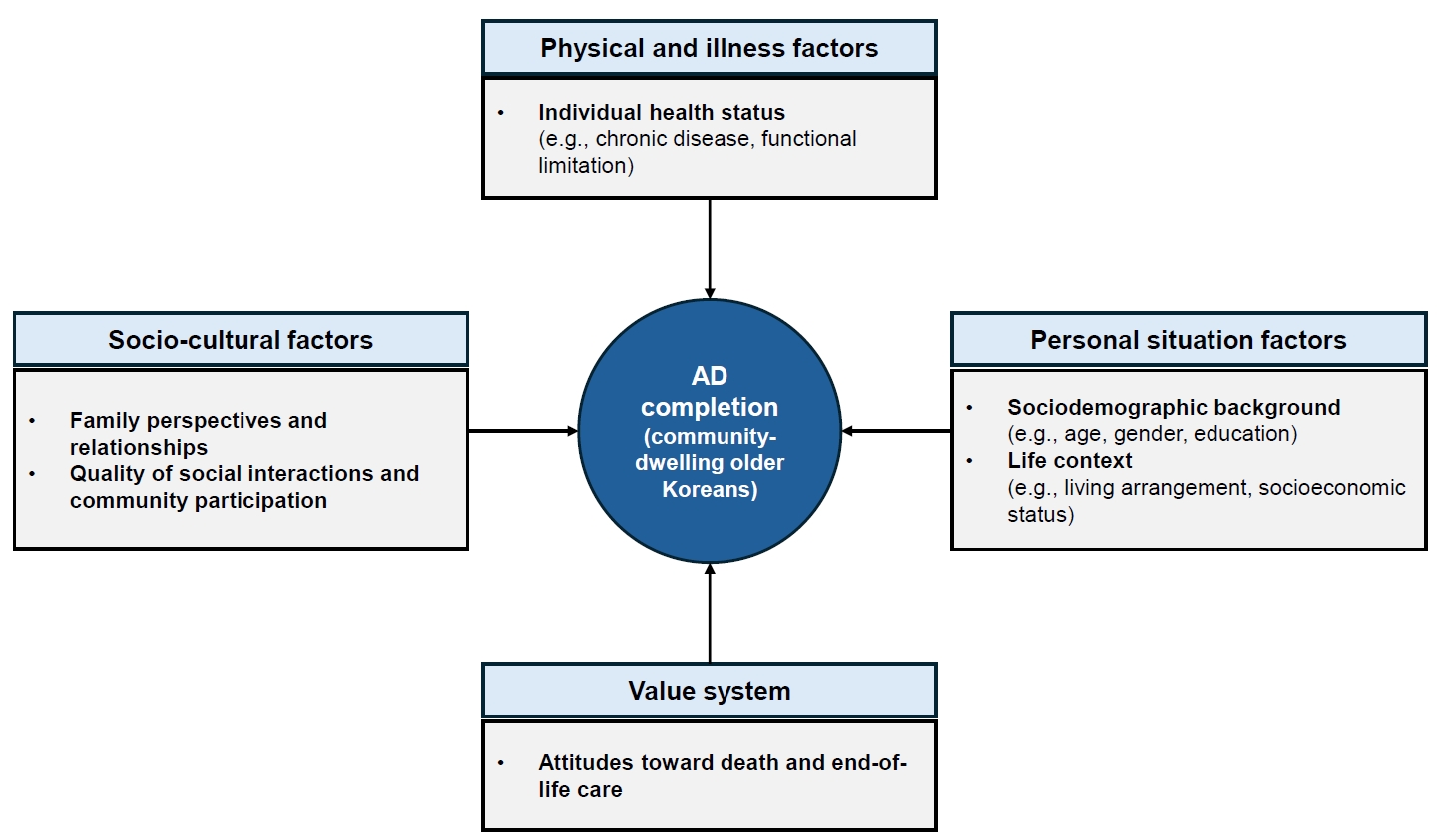Search
- Page Path
- HOME > Search
- Multidimensional factors influencing the completion of advance directives among community-dwelling older Koreans
- Hee-Ju Ji, Soong-Nang Jang
- J Korean Acad Nurs 2025;55(4):543-556. Published online November 18, 2025
- DOI: https://doi.org/10.4040/jkan.25098

-
 Abstract
Abstract
 PDF
PDF ePub
ePub - Purpose
This study aimed to examine the multidimensional factors associated with the completion of advance directives (ADs) among community-dwelling older Koreans, guided by conceptual frameworks developed in Asian contexts.
Methods
Data from the 2023 National Survey of Older Koreans (sixth wave) were analyzed for 9,951 community-dwelling older Koreans aged 65 years or older. Complex sample cross-tabulation and binary logistic regression analyses were conducted.
Results
In total, 11.1% of community-dwelling older Koreans had completed an AD. Significant factors associated with AD completion were identified across four domains—personal situation: age, educational level, religion, and housing preference in the event of poor health; socio-cultural: presence of children, participation in social activities and satisfaction with social relationships; physical and illness: the number of chronic diseases; and value system: awareness of hospice and palliative services, participation in death preparedness education, and documentation of organ donation.
Conclusion
Among older Koreans, AD completion represents more than a documentation process; it reflects a complex decision-making process shaped by their values and life circumstances, underscoring the need for supportive interventions. As the highest AD completion rates are found among older adults, related policies should be aligned with older adult-centered policy frameworks.
- 1,298 View
- 112 Download

- The Current Status of Adult Day Care in Korea: Operation, Staffing, and Service
- Yeon Hwan Park
- Journal of Korean Academy of Nursing 2007;37(4):613-623. Published online March 28, 2017
- DOI: https://doi.org/10.4040/jkan.2007.37.4.613
-
 Abstract
Abstract
 PDF
PDF Purpose The purpose of this study was to describe the operation, staffing, and services provided at adult day care centers in Korea.
Methods The study was a cross-sectional descriptive survey. The subjects were 209 centers among 280 centers registered in Korea (response rate 74.6%). The data was collected from August to December in 2006.
Results 48.8% of centers were located in a city area. The centers were based on the Social Model 65.5% of the centers were open Monday to Friday, an average of 7~8 hours per day. Dementia, stroke or frail elderly could use the center, and 57.4% of centers were used for dementia and stroke elderly together. The enrollment of elderly was 13.5. The number of total staff was 8.27, the number of RN's and social workers was 0.67, and 2.54 respectively. The social services(Meal preparation 98.6%, Special event 98.1%, Transportation, 97.1%) were provided more than the health services(Physical therapy 98.1%, ADL training 95.2%, Counseling 84.7%, Vaccination 82.8%, Health monitoring 78.9%, Health education 78.5%, Bathing 66.1%, and Speech therapy 28.2%).
Conclusion These results suggest we have to develop a health-focused adult day health care model based on the needs of elderly and their families. Nurses will have an important role in adult day health care.
-
Citations
Citations to this article as recorded by- Korean Terminology for Frailty
Chang Won Won M.D.
Journal of the Korean Geriatrics Society.2012; 16(2): 51. CrossRef
- Korean Terminology for Frailty
- 811 View
- 6 Download
- 1 Crossref

- Effectiveness of Home Health Care Service for Elders after Spinal Surgery
- Myunghee Jun, Ji Young Jung
- J Korean Acad Nurs 2012;42(7):1009-1018. Published online December 31, 2012
- DOI: https://doi.org/10.4040/jkan.2012.42.7.1009
-
 Abstract
Abstract
 PDF
PDF Purpose This study was done to evaluate effectiveness of home healthcare services (HHCS) specialized for elders who received spinal surgeries.
Methods A non-equivalent control group pre-post test quasi-experimental study was performed. HHCS was developed based on the Rice model of dynamic self-determination for self-care. For data collection, a control group (n=23) and an experimental group (n=23) were selected by matching age, BMI, pain, general characteristics and type of spine surgery. Measurement tools to evaluate uncertainty and knowledge were developed by the authors. The Numeric Rating Scale (NRS) and Japanese Orthopedic Association Back Pain Evaluation Questionnaire (JOABPEQ) were used to evaluate pain levels. Muscular strength in the legs was measured using a digital muscle tester and tape ruler. Questionnaires were used to evaluate disability in performing ADL and psychological distress levels.
Results The experimental group showed significant decrease in uncertainty (
p =.028), increased knowledge (p =.038), and partially decreased pain (p =.003-.331). Partial muscle strength increased significantly (p =.021-.644). Disability in performing ADL and psychological distress in the experimental group decreased significantly compared to control group (p =.002,p =.004).Conclusion Results indicate HHCS is an efficient home care nursing program for these elders. Further experimental studies with larger samples are required to confirm effects of HHCS.
-
Citations
Citations to this article as recorded by- Development of multidisciplinary, evidenced-based protocol recommendations and implementation strategies for anterior lumbar interbody fusion surgery following a literature review
Richard Meyrat, Elaina Vivian, Archana Sridhar, R. Heath Gulden, Sue Bruce, Amber Martinez, Lisa Montgomery, Donald N. Reed, Peter J. Rappa, Hetendra Makanbhai, Kenneth Raney, Jennifer Belisle, Stacey Castellanos, Judy Cwikla, Kristin Elzey, Kristen Wilck
Medicine.2023; 102(47): e36142. CrossRef - Effects of Functions of Daily Living, Depression, and Anxiety on Catastrophizing Pain among Patients Undergoing Lumbar Spinal Surgery
Jeong Eun Yoon, Ok-Hee Cho
Journal of Korean Academy of Fundamentals of Nursing.2020; 27(3): 289. CrossRef - The effectiveness of home health care for reducing readmissions: an integrative review
Danielle M. Siclovan
Home Health Care Services Quarterly.2018; 37(3): 187. CrossRef - Factors Affecting Post-operative Uncertainty of the Patients Undergone Lumbar Spinal Surgery
Myunghee Jun, Jiyoung Jung, Minsuk Kim
Journal of muscle and joint health.2012; 19(3): 294. CrossRef
- Development of multidisciplinary, evidenced-based protocol recommendations and implementation strategies for anterior lumbar interbody fusion surgery following a literature review
- 1,081 View
- 8 Download
- 4 Crossref

 KSNS
KSNS
 E-SUBMISSION
E-SUBMISSION

 First
First Prev
Prev


